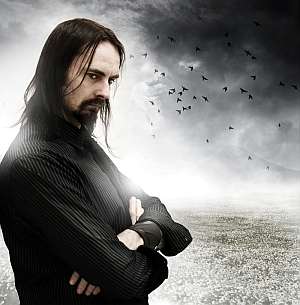 Interview with
Interview with
Aaron Stainthorpe (lead vocals) from My Dying Bride
MY DYING BRIDE is one of the pioneers of Doom Metal, founded in 1990 and going strong today, we are soon to be treated to their 11th studio album ‘A Map Of All Our Failures’, which is coming out in October (15th in Europe, 16th in USA ). It has been described as “a further voyage into the darkest depths of humanity, religion, folklore, love & death”. On behalf of Reflections of Darkness I had an excellent opportunity to phone Aaron and discuss about the new album, his lyrical work for the band and other matters...
Reflections Of Darkness [RoD]: Can you tell me about the concept behind your new album ‘A Map of All Our Failures’, I’ve seen the description of Andrew’s [Craigan] of it as “a controlled demolition of all your hopes.” - What was it that has led you and inspired you conceptually here?
Aaron Stainthorpe [Aaron]: It’s what I would consider the next evolutionary stage from ‘ For Lies I Sire’, which is now three years old, so in that three year period we continued to write and mature, and our song- writing has improved as indeed it should do. The more you practise something, in theory, the better you should become. So with the improvements in our song-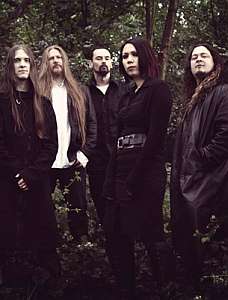 writing and our desire to improve on what we’ve done before I think we’ve created something that’s fresh and still interesting even after all these years, but without losing sight of our roots. So it’s almost typical MY DYING BRIDE (MDB) album, I suppose, and there are elements of Doom and Gothic and Death Metal there and the subject matters are similar subject matters that we discussed in the past, but again in order to keep these ideas fresh we’ve approached certain subjects from a different angle rather than doing the same thing constantly. So far the reaction has been a very positive for us, which is great. And I would suspect that if you liked anything by MDB in the past there’s a very good chance you’re going to like this, because it’s similar stuff, but it’s performed better.
writing and our desire to improve on what we’ve done before I think we’ve created something that’s fresh and still interesting even after all these years, but without losing sight of our roots. So it’s almost typical MY DYING BRIDE (MDB) album, I suppose, and there are elements of Doom and Gothic and Death Metal there and the subject matters are similar subject matters that we discussed in the past, but again in order to keep these ideas fresh we’ve approached certain subjects from a different angle rather than doing the same thing constantly. So far the reaction has been a very positive for us, which is great. And I would suspect that if you liked anything by MDB in the past there’s a very good chance you’re going to like this, because it’s similar stuff, but it’s performed better.
RoD: You’ve always been open to trying out new things; did you include experimentation on this album?
Aaron: Well, actually because we did ’Evinta’ a couple of years ago, which was a kind of a bit special, and then recently ‘The Barghest O’Whitby’, which was a bit more aggressive and a sort of a nod to the past, now when it comes to doing the new album it’s more a case of “ok, we’ve been messing around, let’s focus on what we’re good and best at and what people would expect of MDB”, so we tried to make the album a bit more normal if you like. The EP is a great experimental ground, and so I think the next time we do something that’s a bit weirder and off track it’ll be an EP rather than an album. But it’s nice to mess around with stuff that doesn’t necessarily fit MDB and then do it as maybe a B-side or something like that... like we did we with ‘Scarborough Fair’, the cover version and the cover of ‘Failure’ [SWANS]. EP is great for that, but when it comes to the album, in all honesty, it’s better to concentrate on what you’re good at and what people expect and that’s what we’re doing in this moment in time, so we’ve no plans right now to do anything off track, but that doesn’t mean we’re not going to!
RoD: I’m glad to hear that! Even from your lyrics it’s obvious you’re a great lover of poetry, and literature as a whole. Was there particular work or author that has inspired lyrics on this album?
Aaron: Not really, to be honest, in the early days I used to be inspired by the dead English poets and that was fine for that period, but now I really want to find my own style and so I’m trying not to be too influenced by the things that I read poetry-wise. And I read a lot of literature, anything, from autobiographies up to science fiction and comedy, and those things don’t necessarily influence me, but I just like words and I like the way words flow sometimes. If 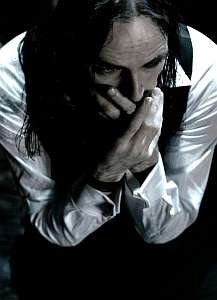 you read a really good book you can be influenced by that book, not necessarily by of its subject matter, but admire the quality of the writing. So I couldn’t give you a name of the author or anything specific that has inspired the lyrics for the last couple of years... Just thoughts that pop in my head, I write them all down and when it comes to constructing a song I try to take these ideas and shape them into some form of a story to go along with the music that the rest of the guys created. And quite often when I write without music I consider them poems and then when music comes along I convert the poem to the lyric in order to get it into music. So I couldn’t really give you a name of anyone who’s influenced me... it’s a loose attitude to influences: when it comes... it comes and don’t go out looking for it.
you read a really good book you can be influenced by that book, not necessarily by of its subject matter, but admire the quality of the writing. So I couldn’t give you a name of the author or anything specific that has inspired the lyrics for the last couple of years... Just thoughts that pop in my head, I write them all down and when it comes to constructing a song I try to take these ideas and shape them into some form of a story to go along with the music that the rest of the guys created. And quite often when I write without music I consider them poems and then when music comes along I convert the poem to the lyric in order to get it into music. So I couldn’t really give you a name of anyone who’s influenced me... it’s a loose attitude to influences: when it comes... it comes and don’t go out looking for it.
RoD: As your lyrics have these definite feel of where you live, it just transmits, so I wondered if you’ve read poetry of Ted Hughes, if it resonated as he drew inspiration from the Yorkshire landscapes also?
Aaron: Yeah... I’m not a huge fan of local poets. I think because I’ve made Yorkshire my home, but I grew up in Germany and I’ve moved around a lot as my father was in the army, so bizarrely I can’t really pinpoint where I’m from, but I’ve adopted Yorkshire as my home and so I can’t really relate to the likes of Ted Hughes as well as someone who perhaps was born and bred in Yorkshire. I can see the attraction there, but I’m kind of... some kind of a gypsy person... [laughs] I’m from all over the place! I’ve been influenced by so many things in my life I can’t nail it down. But yeah...I mean Ted Hughes is all over where we live. I live near this little town called Hebbden Bridge [West Yorkshire] and Ted is like the God of that town, he’s absolutely everywhere... I’ll have a look one day, his books are absolutely everywhere, I’ve just never delved into it, but I’m going to certainly check it out.
RoD: That’s great, because you share inspirations of those landscapes... and I get the poems/ lyrics as paintings as well.
Aaron: Yeah, the beauty about Yorkshire is that there are hills, lakes, forests and rivers all over the place, you don’t have to go far to be out in the wilderness and that’s very influential on the things I write . You go for a walk on the moors, even on a rainy day, because the great thing 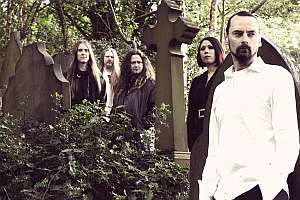 about a rainy day is that there’s nobody else about and there’s something about the pitter-patter of the rain on your head or if you’re somewhere near the lake there’s something mesmerising and deeply inspirational and clearly that has affected my style of writing and so people must be able to discover what part of the world I’m from or at least what the area looks like through the lyrics.
about a rainy day is that there’s nobody else about and there’s something about the pitter-patter of the rain on your head or if you’re somewhere near the lake there’s something mesmerising and deeply inspirational and clearly that has affected my style of writing and so people must be able to discover what part of the world I’m from or at least what the area looks like through the lyrics.
RoD: I think that’s definitely the case... Are there any plans to release a book with your lyrics over the career, your own poetry that didn’t make it to be a part of lyrics etc, maybe accompanied with your illustrations?
Aaron: Yeah, there is actually. People asked me about it a few years ago and at first I thought it sounds as a good idea but it’s probably not gonna happen. But as I’ve been asked these questions for last couple of years and the record label seems to think it might be a good idea, the rest of the band think it might be an interesting idea so I guess that in some point in the future I’m going to collate all the lyrics as well as poems that never got used for MDB, short stories that I’ve come up with, which we never really intended for anything as I write for pleasure sometimes. And it looks like now I might have somewhere to pour all these things along with some photography I’ve done and some of the artwork. It sounds like an interesting project, so yes, I think a book is inevitable, but I don’t know when, there is no deadline, which is good, I don’t want to be pressured into doing something by a certain time. I think I’ll take my time to collect all this information, make sure it’s a good enough quality and then see if we can get it published.
RoD: That’s great! You have a buyer already! One sitting here!
Aaron: Hey, thank you very much!
RoD: Thank you, you’ve been an inspiration.
Aaron: That’s great news, I appreciate that!
RoD: Let’s go back to the music. How is the new line up working out for you? Because I’ve heard you’ve lost your drummer.
Aaron: [laughs] Yes, yes, we’ve had one or two line up changes, but this is unavoidable. When people go they just go, we’re not gonna try to keep someone in the band that doesn’t want to be there anymore. Dan [Mullins] was the last guy to go and we officially don’t have a drummer. Dan went because he was forever breaking limbs and simply became unfit to drum, he broke his arm and then when his arm got better and he was just about to help us out again he broke his leg and then when he was getting better he broke his other leg, and you just think ”what the fuck are you doing, when you have a job to do stop doing dangerous things!” 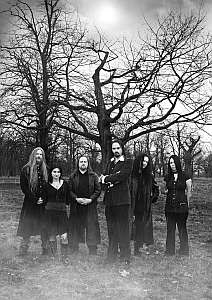 so he went and we didn’t bother replacing him. We had Shaun Taylor-Steels, the previous MDB drummer, he helps us out at the rehearsals rooms before the shows and he helped us with the writing and recording of the new album, and when we do play live we have David Gray from AKERCOCKE and it’s a good working relationship. It’s not ideal, but it works for what we need it for at the moment. And it would be better to have an official drummer; we’re not openly looking for one, but if someone comes up and says “hey, I would like to audition”, we’d certainly take a look at it. And the rest of the guys are working pretty solidly, we feel like a solid unit, even young Shaun [MacGowan], who hasn’t been in the band too long, his violin and keyboard work is really empathising some of the sorrowful moments on the album and we want his own input too. We’re not writing music for him and telling him to play it; he’s writing his own music and he’s bringing it to us, and that’s exactly what we want from him and Lena [Abé] as well. We want their input, we want their ideas and they will help shape the new sound of MDB and that’s gotta be a good thing!
so he went and we didn’t bother replacing him. We had Shaun Taylor-Steels, the previous MDB drummer, he helps us out at the rehearsals rooms before the shows and he helped us with the writing and recording of the new album, and when we do play live we have David Gray from AKERCOCKE and it’s a good working relationship. It’s not ideal, but it works for what we need it for at the moment. And it would be better to have an official drummer; we’re not openly looking for one, but if someone comes up and says “hey, I would like to audition”, we’d certainly take a look at it. And the rest of the guys are working pretty solidly, we feel like a solid unit, even young Shaun [MacGowan], who hasn’t been in the band too long, his violin and keyboard work is really empathising some of the sorrowful moments on the album and we want his own input too. We’re not writing music for him and telling him to play it; he’s writing his own music and he’s bringing it to us, and that’s exactly what we want from him and Lena [Abé] as well. We want their input, we want their ideas and they will help shape the new sound of MDB and that’s gotta be a good thing!
RoD: It is good as I think the opposite of control freaks can be detrimental.
Aaron: Oh God, yes. It would be easy, but awful if me and Andrew just told everyone what to do. And I think you would have a linear sound, which wouldn’t be that interesting, you need other input to keep it fresh.
RoD: You’re approach is pretty much democratic!
Aaron: Oh yeah, definitely, there’s stuff on this album written by every member of the band.
RoD: Brilliant! - I absolutely loved the video Charlie Granberg directed for ‘Bring Me Victory’. Will you be working with him again?
Aaron: Yeah, Charlie will be doing another two videos for us. At the end of October we’ll be shooting the video for ‘The Poorest Waltz’, which will feature me dancing with some blind girls, which is going to be quite unique, I suspect. And then because we’ve actually recorded 13 songs in the studio, we have some leftover songs and they are going to be on a new EP, which will be out at the beginning of the next year and we’re gonna shoot a video for that as well and Charlie will be doing both.
RoD: I’m delighted to hear that! In your EP the ‘The Barghest O’ Whitby’ you utilised a local legend, is it something you want to revisit in the future?
Aaron: Well, maybe, you never know. Obviously where we’re from it’s a big county, Yorkshire’s huge, but it’s probably the least populated county in the whole of the UK. So there’s a lot of land and not a lot of people and some of the old villages have a lot of folklore, tales and I’ve read some literature on these various villages and the thing that seems to link them all is that they all have a tale about a big black dog, some form of hound that patrols the moors that surround the area. And I’m sure it’s just to keep children in check, but I like this idea and so rather than copy a specific story from a specific town, I thought I’d create my own barghest, which is an old word people don’t use anymore, it means “the spirit of an animal”. So I thought 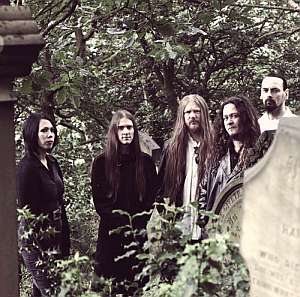 ok, by using various elements from these local stories I’m gonna create a brand new story and secretly hoping that in a hundred years time people will look back and think that the barghest is actually a real tale from one of these North Yorkshire towns. But it’s nice to dip into folklore from time to time, but again I don’t want to go down that route too much. We’re not a folky band; we’re not gonna start playing medieval instruments or anything like that. We did ‘Scarborough Fair’ originally as a cover and that’s a nice miserable piece of music relating to this area, then we did ‘The Barghest O’ Whitby’ same kind of postal area and I think that’s enough for the time being, we don’t want it to become a gimmick. If we do it too much then with every new album people will be saying “ok which one is the folklore song”, so we’re sure we will do something similar in future, but there’s nothing currently on the album relating or specific to the Yorkshire area.
ok, by using various elements from these local stories I’m gonna create a brand new story and secretly hoping that in a hundred years time people will look back and think that the barghest is actually a real tale from one of these North Yorkshire towns. But it’s nice to dip into folklore from time to time, but again I don’t want to go down that route too much. We’re not a folky band; we’re not gonna start playing medieval instruments or anything like that. We did ‘Scarborough Fair’ originally as a cover and that’s a nice miserable piece of music relating to this area, then we did ‘The Barghest O’ Whitby’ same kind of postal area and I think that’s enough for the time being, we don’t want it to become a gimmick. If we do it too much then with every new album people will be saying “ok which one is the folklore song”, so we’re sure we will do something similar in future, but there’s nothing currently on the album relating or specific to the Yorkshire area.
RoD: Having been born originally in Central Europe, I think a lot of the myths of the North England and the feelings they impart resonate with a lot of the folklore from that area and are in many ways similar.
Aaron: I think the whole of Northern Europe is rich in folklore and they’re all similar and I think that it’s simply because when everybody was trading back then of course story-telling was a great form of entertainment, it was their equivalent of our movies, when a traveller came to town, they all wanted to hear the stories. And of course they’d all elaborate on these stories and make them more over the top and turn them impossibly believable. And whole of Northern Europe is filled with this kind of stuff and it’s great.
RoD: What is interesting, as it happens I’ve heard you’ve got quite a big following in Greece, so still it all translates to people who have in some ways a different culture, different landscapes and climate.
Aaron: But I think the appeal as well is of something that’s different, so our culture is very different from the Greek culture and everybody likes something that is a bit foreign and mysterious so it doesn’t really surprise me when people are attracted as opposites attracts and they have masses and masses of culture obviously and ours is completely different, but somehow I like Greek culture and the Greek people seem to like ours and it’s a good mix.
RoD: Definitely. You’ve created artwork for that single yourself, is this something fans can look forward to again in the future as I think it’s great for the fans to have something in their hands done by you personally?
Aaron: I try to create something for most of the things that we release, but sometimes my artwork is too obscure and some of my work is too lyrically influenced. I’ve had a couple of ideas  for the new album, but they just didn’t work, they didn’t capture the essence of the entire album. Because I’m a lyricist, when I create an image sometimes it’s specific to even one line. So I’d create an image and I’d show it to Andy and he’d say “well, it’s great, but what is it?” and I’d pinpoint exactly what it represents and he’d say “it’s great, but that’s for the line, but we need something to represent the entire album”, and sometimes I just can’t see that. So we’re working with Rhett Podersoo, who did the ‘For Lies I Sire’ cover and the’ Bring Me Victory’ cover because he works well with me and we’re on the same wavelength. So I gave him the lyrics for the actual tracks of the ‘Map Of All Our Failures’ and told him the concept of what I expected and he came up with the goods, and it looks great in my opinion.
for the new album, but they just didn’t work, they didn’t capture the essence of the entire album. Because I’m a lyricist, when I create an image sometimes it’s specific to even one line. So I’d create an image and I’d show it to Andy and he’d say “well, it’s great, but what is it?” and I’d pinpoint exactly what it represents and he’d say “it’s great, but that’s for the line, but we need something to represent the entire album”, and sometimes I just can’t see that. So we’re working with Rhett Podersoo, who did the ‘For Lies I Sire’ cover and the’ Bring Me Victory’ cover because he works well with me and we’re on the same wavelength. So I gave him the lyrics for the actual tracks of the ‘Map Of All Our Failures’ and told him the concept of what I expected and he came up with the goods, and it looks great in my opinion.
RoD: I think it’s always interesting to see how one’s ideas are translated by someone else.
Aaron: Oh yeah, definitely, it’s almost like Rhett’s doing a cover of one of our song, it’s nice to see someone else’s version of our work. I love seeing cover bands on the internet, on YouTube, even if it’s badly done I just like to see other people’s interpretations of our work. It’s quite quirky.
RoD: I’ve heard you say that there’s not that as great reception to your work in your native UK as say in the continental Europe, do you think another reason than the one you’ve stated is that it’s maybe due to the Brits traditionally preferring a cup of tea and meaningless conversation about weather rather than dealing with the gloomier and sadder side of life? I don’t mean that in a stereotyping way, but I’ve been living in UK nearly for the last 20 years and it’s been my experience that the people here are more emotionally reserved and opening up takes them a long time.
Aaron: The English are traditionally reserved and conservative about expressing their inner thoughts, the stiff upper lip and all that sort of nonsense. So yeah, it’s kind of a niche market the things that we do. Because normally the world of Heavy Metal, of Heavy Rock is very manly and to write about the things that I do in the way that I do it is very unconventional and it seems that the British aren’t that interested. We’ve done a bit of press this week with some of the Brits, but we don’t do that well in our own country, we rarely play there because of that, and we certainly don’t get recognised in England, but that’s fine, the Continent has been good 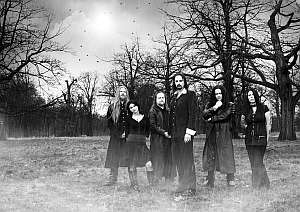 for MY DYING BRIDE. They seem to be much more broad minded and they will listen and absorb all kinds of interesting stuff that perhaps the British aren’t keen on. But I guess also the British like something exotic as well. Why would the British people want to listen to a band from the North of England when they have the whole world to choose from? The Swedish bands are very popular in the UK and so are American bands, but it just seems that they want something foreign because it seems a bit more mysterious and they’re not overly interested in the moaning of the Northern England band.
for MY DYING BRIDE. They seem to be much more broad minded and they will listen and absorb all kinds of interesting stuff that perhaps the British aren’t keen on. But I guess also the British like something exotic as well. Why would the British people want to listen to a band from the North of England when they have the whole world to choose from? The Swedish bands are very popular in the UK and so are American bands, but it just seems that they want something foreign because it seems a bit more mysterious and they’re not overly interested in the moaning of the Northern England band.
RoD: I don’t know... I’ve seen the difference in audiences say for RAMMSTEIN, who play a very manly Metal/ Hard Rock in a conventional way. I’ve seen them in London and in Athens, and in Athens people went wild straight off, enjoying themselves without restrains, in London the audience was so much more reserved, unsure how to enjoy themselves, looking if someone else is letting themselves go and only if the others did, they would let out a bit of steam.
Aaron: [laughs] Well, yeah, the Brits have always been very reserved; it’s part of our culture and it’s part of our nature and it’s quite quirky and it’s sort of nice really, inoffensive and we’ve certainly learnt to deal with it.
RoD: The internet as a medium has become a blessing and a curse for many bands, in terms of the downloading it means that money for production can be a problem for a band... Does this issue in any way affect you?
Aaron: It does, obviously. People downloading our record illegally is gonna obviously impact on how much money the record label is gonna give us to record the next album. If we don’t earn money we can’t afford to go into the studio to record another album. The music won’t stop; you just end up recording it at home, which actually is a lot easier to do than it used to be. Fortunately for us, we’re that old now that when we started there was no internet so we had good record sales in the early days and to be honest they’re not bad now. So it’s affecting us, but not in such a huge way, because our music is still so underground, it’s so niche that we don’t sell a lot anyway. Who wants to buy music that sounds like it does from us? It’s a very limited audience we’ve got. And we’ve never thought about the money. When we formed in 1990 and called ourselves MY DYING BRIDE, we knew that with the music we were intending 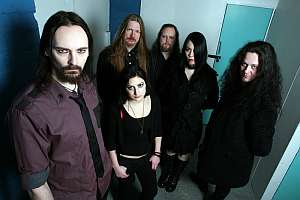 to write there would be no money in this business for us. If you want to make money you have a three and a half minute Rock song that is very catchy and that people can sing along to so it goes on the radio. We’ve never done that and we’ve no intention of doing that and because of that we will never be in the spotlight, we won’t headline a major festival, and we don’t even care!
to write there would be no money in this business for us. If you want to make money you have a three and a half minute Rock song that is very catchy and that people can sing along to so it goes on the radio. We’ve never done that and we’ve no intention of doing that and because of that we will never be in the spotlight, we won’t headline a major festival, and we don’t even care!
RoD: There has been quite a mixed reaction to ‘Evinta’, do you think this was due to the fact that bands tend to be type-casted and it’s difficult for fans and critics alike to absorb the change from the signature sound they got used to? Say like someone loves ‘For Lies I Sire’ the most and expects you to sound like that for the rest of the albums.
Aaron: Well, people say that with everything. You lose and gain admires with every single thing you do. When we released ‘Evinta’, we did actually forget to tell people that it was just a project so people thought that was the new direction of MDB. And so some people were like “oh, my God, where are the guitars, where are the drums, this is outrageous!” And so after it was released and we saw the feedback on the MDB website, though the forum, we realised: ”oh yeah, we forgot to tell them it was just a project.” And so then we announced on the website: “this is not a new direction folks, this is just some ideas we we’ve been thinking about for a number of years and we’ll be back with another regular studio album soon” and it was only then there was a collective sigh from many fans. But it was a great project to do and I really enjoyed doing it; just listening to some of the older tracks, picking the very best bits, mixing them all up, trying to get them back together and then getting French opera singer to sing some of the vocals, writing new lyrics. It was a huge project, and it took a long time to put together and it’s becoming widely loved now a couple of years after its release. It went down well too, I remember seeing a review in The Sun, a daily newspaper, who gave it four out of five and was raving about it. And when the national press are backing you, it must be a good thing.
RoD: Personally I loved the album; I think it was great to hear you from another angle.
Aaron: It’s interesting stuff and I really enjoyed doing it, it was a great project and hard work, but I think it was worthwhile.
RoD: Are you ever affected by the reviews and reactions of the fans?
Aaron: I try not to read the reviews, because... kind of... if I read too many great reviews I might become some kind of ego-fuelled rock star asshole and I would prefer not to do that, and if there were lots of negative reviews, then of course I don’t want to read negative reviews so I simply choose not to read any reviews. But every once in a while Andrew or Lena or 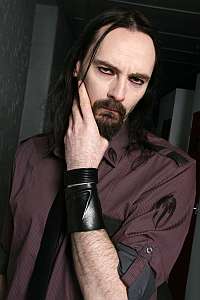 Hamish[Glencross] would send me a link to something, saying “have a little look at this, it’s good” and there is normally a positive review at the end of it and it kinda makes you feel good, it makes it all seem worthwhile.
Hamish[Glencross] would send me a link to something, saying “have a little look at this, it’s good” and there is normally a positive review at the end of it and it kinda makes you feel good, it makes it all seem worthwhile.
RoD: You’ve been with Peaceville for a long time, why has your co-operation with them over the years been so successful?
Aaron: Because they’ve allowed us a complete artistic freedom from the very first day. No one else would allow us something like that. I know this as we’ve had offers from other labels, and we’ve looked at some of the restrains and they wouldn’t allow us some of the things we want to do. Peaceville Records just said “we love MDB; we’re not going to change you, do whatever you want.” That’s how you can get away with stuff like ‘Evinta’ and ‘Barghest’. I mean, if we were on a big label, and we presented the concept of ‘The Barghest O’ Whitby’, a 27 minutes long Death Metal song they would just throw it out of the window, because they’re just looking how they can make money out of your band, and a 27 minute song like that is gonna get no radio play so they’d dismiss that as a ridiculous idea whereas Peaceville Records welcomed it with open arms. So I can’t see us leaving Peaceville unless we signed a really flexible contract with a bigger label, but that’s unlikely. People want to throw money at MDB; we’ve had some big offers, but the problem is of course when they give you all that money at some point they would like all that money back. And the way they want that money back is through radio play and some commercial songs, so eventually they’ll try to mould you into something that generates much more income and if that is something you don’t want to do you’re in the wrong business. So we’re happy to stick with Peaceville, there’s no money here, but the freedom to do what we want is worth more than gold.
RoD: Thank you very much for your time for this interview. It’s been my honour to have spoken to you.
Aaron: It’s been my pleasure, thank you very much for your time.






Comments powered by CComment